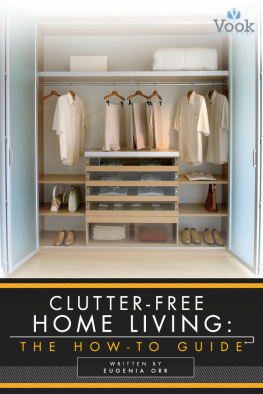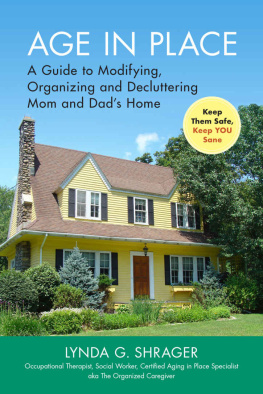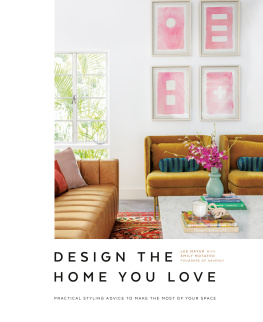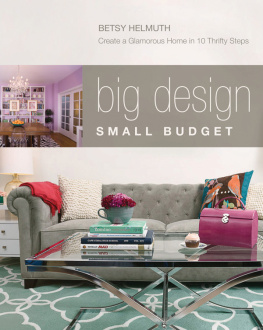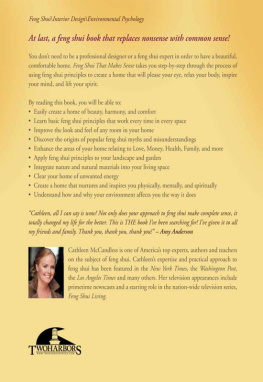GLOSSARY
Agility: Ability to move easily, smoothly, and/or quickly. Usually refers to ambulation but may be used in reference to hand ability or dexterity.
Alzheimers Disease: A disease that causes progressive brain dysfunction. It is one of the most common causes of decreased brain function. Alzheimers dementia is a progressive mental deterioration that is more common as people reach late age and is associated with memory loss, language problems, and personality changes.
Ambient Lighting: Lighting in a room or area in general, versus spot or targeting lighting for tasks. Often refers to light cast from windows and skylights, although it can refer to general ceiling illumination for a large area.
Arthritis: A group of diseases that involve inflammation or damage to joints of the body making movement of affected parts difficult.
Banister Rail: A rail supported by posts secured to stairs or attached to a stairwell wall that follows the edge of a stairwell. It is a safety feature, although can be quite decorative.
Bed Transfer Slings: A fabric sling suspended from a movable device attached to the ceiling beams that enables someone supported in the sling to be moved, mechanically, from a wheelchair or side chair into a bed. Getting into and out of the sling requires human effort.
Bifocals/Trifocals: Eyeglass lenses made in two or three parts by different grindings. The top portion is for distance focusing and the bottom is for close focusing such as reading. In trifocals the middle grind accommodates mid-distance focusing.
Bullnose (in reference to countertop edging): A rounded convex edge that forms the edge of a counter top.
Cadillac Toilet: Refers to any toilet that offers fancy trappings beyond the normal flushing and carrying away the waste, i.e., some toilets double as a bidet, cleaning the user, and eliminating the need for the use of toilet paper.
Cans: Ceiling installed canisters that are electrical fixtures and hold a flood type bulb, Halogen or LED.
Ceiling Floods: Interior flood lights (bulbs) used in specific canisters that are recessed into the ceiling into the space between floors. They can hold bulbs meant to provide ambient light or spot targeted, task lighting.
Chair Rail: Originally a molding strip installed on a wall at the height of a chair back preventing the chair from being moved back into the wall. It can be used as a design element to separate the finish of the lower wall from the upper wall.
Corian (Countertops): A E. I. du Pont de Nemours trademarked product made of a synthetic composite that is relatively impervious to stains. Sometimes used to define a type of synthetic countertop material that may be similarly durable, but of a different patent.
Dementia: A mental condition from any one of a variety of causes, marked by functional loss, memory loss, and at least one other brain impairment, such as language or visual-spatial orientation problems.
Easy Chair: A chair in which to lounge or relax.
Edge Seat (in reference to showers): A tub edge that is wide and flat enough for someone to sit upon it at least temporarily while transferring into or out of the tub/shower.
Emergency Call Buttons: Buttons, whether worn a device mounted, that connect through hard wire or airwaves transmission to a central location that responds or sets response in motion.
Ergonomic Design: Maximization of interface between worker and equipment or environment for efficiency and ease of use.
Flip Windows: Windows that do not slide up and down or sideways, but rather flip on an axis from inside to outside. They facilitate cleaning of both sides of the glass from inside, and can be set at an angle to provide 100 percent exposure to the outside air since 50 percent of them are not a fixed pane.
Fluorescent Lighting: Bulbs common in industrial and commercial settings, kitchens, and bathrooms. They have been adapted from their original shape of long and cylindrical to be able to fit in normally incandescent fixtures. They consume considerably less electricity for the amount of light emitted than incandescent bulbs, at economic prices. They generally require an open fixture.
Formica (Countertops): A composite, patented material of the Formica Corporation, used for countertops for more that 30 years. It is relatively inexpensive, but may be subject to cuts and stains on its surface.
Galley Kitchens: Kitchens that are long and narrow with cabinets and appliances along both sides, reminiscent of what one would expect in a boats kitchen.
Good Grip: A brand of tools for the home or garden with padded handles and ergonomic engineering manufactured by OXO International, Ltd.
Grab Bar: A securely mounted bar that has space between it and the wall behind to be grasped firmly. It is used alongside a toilet or inside or next to a tub or shower to facilitate safe sitting, standing, and stepping.
Handicap: A disability that distinguishes one from the population "norm."
Hardscapes: Outside surfaces that are firm for walking, i.e., paving, stones, wooden decks.
LED Bulbs: Offer great longevity and their solid composition (unlike a filament incandescent bulb) makes them less breakable. They are still relatively expensive for the amount of light emitted.
Levers (in reference to door handles, etc.): Door openers that do not have to be gripped firmly to open the door latch; they require a downward pressure, not the torque required for a door knob.
Linear Elements (reference found in color considerations chapter): Design or color elements that run in straight lines, versus circular or random patterns, or solids.
Lock Box: A box that hangs on an exterior door handle that has designated, limited access (i.e., the fire department, or the Real Estate multiple listing association) within which a house key is kept.
Mobility: The quality of moving about freely.
Monitor Magnifier: A magnified glass that specifically fits in front of a computer screen to enlarge images beyond the capability of the program being viewed.
Parkinsons Disease: One of several motor system disorders caused by the loss of dopamine-producing brain cells. It manifests itself in tremors, stiffness, slowness of movements, and falls. Parkinsons disease can be associated with dementia or depression.
Portable Call Buttons: See Emergency Call Buttons above. When worn on a bracelet or around the neck as a necklace, it is portable.
Pre-fab Fiberglass Showers: One piece pre-formed shower stalls of a fiberglass material. They are installed as a seamless unit in a space plumbed for their faucet and drain openings.
Pull Cords (in reference to emergencies in bathrooms): An emergency button may be difficult to reach in a shower or alongside a bed, but a cord hanging from the central control provides a wider range of access.
Recessed Lighting: Lighting installed above the level of the ceiling.
Retractable Screens: Screens that roll to one side into a tube. They are used with floor-to-ceiling slider glass doors so that when the door is closed and the screen not needed, no screen is visible. When the door is opened the screen unrolls as it is pulled across the opening and fastened to remain stretched across the opening.
Safety Glass: Sandwiches a thin layer of flexible clear plastic film between pieces of glass that holds the glass in place should it be impacted. The film can also stretch with the glass sticking to it, making it quite difficult to penetrate laminated safety glass. Some residential window placements are dictated to require safety glass.




